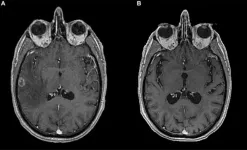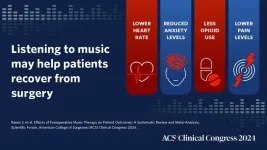(Press-News.org) Dr. Ursula White, an associate professor of Clinical Science at Pennington Biomedical Research Center, is taking a deep dive into the lasting health effects of short-term weight gain and weight loss. The ability for the fat tissue to expand or contract to accommodate changes in body weight is important for sustained health. Dr. White’s clinical study at Pennington Biomedical, the EAT2 study, will allow her to explore how changes within the adipose tissue are affected by weight gain and weight loss, and what that means for a person’s health.
The EAT2 study is recruiting participants now, and participants will be randomly assigned to the two groups – a control group that is weight stable and group with a diet that promotes weight gain. Both groups will participate in a dietary intervention program for 8 weeks, but those in the weight gain group will also be provided with an eight-week weight loss treatment following the dietary intervention.
"This study is unique in that it will explore what exactly happens to your heath during periods of weight gain and weight loss and how the fat tissue can mediate these changes,” said Dr. White, who is the director of the Physiology of Human Adipose Tissue Lab at Pennington Biomedical. “Yes, the active group will be prescribed a diet intended to promote weight gain, but those participants will also receive weight loss guidance during the study. Several active participants have shared that they lost more weight than they gained, and while that result isn’t guaranteed, we still invite the community to help us learn more about how weight change can impact your health.”
To qualify for the study, participants must be a man or pre-menopausal woman between the ages of 18 and 42, and have a body mass index, or BMI, in the range of 23 to 35. The study lasts approximately 9 months, and includes a screening visit, and 11 study visits, including two optional overnight stays at the Pennington Biomedical Inpatient Unit.
The EAT2 study is funded by the National Institute of Diabetes and Digestive and Kidney Diseases of the National Institutes of Health.
While most may think of adipose tissue as undesirable, and a place where the body stores excess calories, the tissue has many other functions that influence a person’s metabolism and health. The fat tissue responds to insulin and also secretes factors that influence appetite, the immune system, hormone levels and more. The study will explore the health impacts of weight gain and loss in the context of these factors.
"At Pennington Biomedical, we are committed to addressing the root causes of obesity, and addressing metabolic disease,” said Dr. John Kirwan, executive director of Pennington Biomedical. “The EAT2 study is a great example of the foundational science that takes place at our world-renowned campus. By understanding the fundamental functions of adipose tissue mechanisms, we can open new avenues of research and uncover new knowledge.”
Study participants will be compensated for their time and participation in the study. In addition to information on their individual health profile, compensation of up to $1,255 is offered for the completion of the study.
The EAT2 study is long in the making, as it originally started in the weeks prior to the outbreak of the COVID-19 pandemic. Dr. White successfully secured continuing grants to sustain its progress and ensure its completion. With the study fully underway, it is expected to wrap up in 2025.
About the Pennington Biomedical Research Center
The Pennington Biomedical Research Center is at the forefront of medical discovery as it relates to understanding the triggers of obesity, diabetes, cardiovascular disease, cancer and dementia. The Center conducts basic, clinical, and population research, and is a campus of the LSU System.
The research enterprise at Pennington Biomedical includes over 530 employees within a network of 44 clinics and research laboratories, and 13 highly specialized core service facilities. Its scientists and physician/scientists are supported by research trainees, lab technicians, nurses, dietitians, and other support personnel. Pennington Biomedical is a state-of-the-art research facility on a 222-acre campus in Baton Rouge.
For more information, see www.pbrc.edu.
END
Pennington Biomedical’s EAT2 study to explore unknown effects of weight fluctuations
Dr. Ursula White of Pennington Biomedical Research Center leads the study to determine how changes in fat tissue during weight gain followed by weight loss affect your health
2024-10-18
ELSE PRESS RELEASES FROM THIS DATE:
Butterfly brains reveal the tweaks required for cognitive innovation
2024-10-18
A species of tropical butterfly with unusually expanded brain structures display a fascinating mosaic pattern of neural expansion linked to a cognitive innovation.
The study, published today in Current Biology, investigates the neural foundations of behavioural innovation in Heliconius butterflies, the only genus known to feed on both nectar and pollen. As part of this behaviour, they demonstrate a remarkable ability to learn and remember spatial information about their food sources—skills previously connected to the expansion of a brain structure called the mushroom bodies, responsible for learning and memory.
Lead author Dr Max ...
Time to sustained recovery among outpatients with COVID-19 receiving montelukast vs placebo
2024-10-18
About The Study: In this randomized clinical trial of outpatients with mild to moderate COVID-19, treatment with montelukast did not reduce duration of COVID-19 symptoms. These findings do not support the use of montelukast for the treatment of mild to moderate COVID-19.
Corresponding Author: To contact the corresponding author, Susanna Naggie, MD, MHS, email susanna.naggie@duke.edu.
To access the embargoed study: Visit our For The Media website at this link https://media.jamanetwork.com/
(doi:10.1001/jamanetworkopen.2024.39332)
Editor’s Note: Please see the article for additional information, including other authors, author ...
Drones prove effective way to monitor maize re-growth, researchers report
2024-10-18
Maize, or corn, grows tall, with thin stalks that boast ears of the cereal grain used in food production, trade and security globally. However, due to rain, wind and other increasingly extreme weather events, the maize falls down, risking the entire crop. Called lodging, the physical fall results in shorter plants and overlapping leaves — both of which negatively impact the plant’s ability to grow.
Conventional lodging prevention and mitigation requires many agricultural technicians significant time to investigate the crop fields, according to a team of researchers based in China. They ...
Materials of the future can be extracted from wastewater
2024-10-18
"The perspective is enormous, because you’re taking something that is currently waste and making high-value products from it."
This is what Professor Per Halkjær Nielsen, Department of Chemistry and Bioscience at Aalborg University in Denmark, says about the results of a research project that utilizes surplus biomass in wastewater treatment plants in new ways. The focal point is biopolymers that can be described as long chains of molecules that are bound to each other and that are produced by living organisms, including bacteria. Today, synthetic ...
Long-lasting immunotherapy response in stage IV lung cancer with brain metastasis
2024-10-18
“In the last decade, immunotherapy agents changed the treatment landscape for Non-Small Cell Lung Cancer (NSCLC).”
BUFFALO, NY - October 18, 2024 – A new case report was published in Oncoscience (Volume 11) on October 8, 2024, entitled, “Complete and long-lasting response to immunotherapy in a stage IV non-small cell lung cancer with brain metastasis.”
As highlighted in the abstract of this report, approximately 20% of lung cancer patients have brain metastases at diagnosis, which is associated with a worse prognosis and negatively impacts quality ...
American lobster population, habitat preferences shifting, study finds
2024-10-18
American lobsters along Maine’s coast have relocated to new habitats, while the population simultaneously shrunk in abundance and grew older, according to a new study by University of Maine researchers.
For decades, the vast majority of adult lobsters resided in boulder shelter habitats. This knowledge helped inform longtime conservation efforts and regulations within the more than $740 million fishery.
A team of UMaine scientists, however, found that from 1995-2021, occupancy of boulder habitats dropped 60%. Meanwhile, the number ...
ASA invites media to virtual acoustics meeting Nov. 18-22
2024-10-18
MELVILLE, N.Y., Oct. 17, 2024 – The Acoustical Society of America is hosting a virtual meeting Nov. 18-22. Journalists are invited to virtually attend press conferences on Monday, Nov. 18 and attend technical sessions on Tuesday, Wednesday, and Thursday.
This scientific conference brings together interdisciplinary groups of acoustics professionals, spanning many fields, including physics, medicine, and music, to discuss the latest advancements. From dinosaurs to pipe organs, the virtual conference will cover a wide range of topics. Experts will present ...
Nonnative plants are a major force behind global insect invasions, new study finds
2024-10-18
In an article in the journal BioScience, an international team of researchers led by Dr. Cleo Bertelsmeier from the University of Lausanne, Switzerland, argue that the global spread of nonnative plants is a key factor driving the growing number of insect invasions worldwide. The research challenges traditional assumptions about the principal causes of nonnative insect invasions.
The authors note that when nonnative plants become established in new regions, they create ecological niches that permit the establishment of insect species from the plants' native ranges, which can produce further cascading effects: "Plant invasions ...
Listening to music may speed up recovery from surgery
2024-10-18
Key Takeaways
Music may have a calming effect on patients recovering from surgery– reducing anxiety, perceived pain, and heart rate.
A reduction in cortisol levels when listening to music may play a role in easing patients’ recovery.
Looking for a creative way to quicken your recovery from surgery? The key may be found in listening to music, according to research presented at the American College of Surgeons (ACS) Clinical Congress 2024 in San Fransisco, California.
Researchers at California Northstate ...
Emotional and financial concerns of breast cancer patients are often unmet
2024-10-18
Key Takeaways
Analysis of Reddit posts shows that many breast cancer patients often struggle with multiple emotional and financial concerns during treatment and long after.
There is a need for increased access to education and workshops on coping, treatment decision-making, and understanding diagnoses and prognoses.
Although breast cancer is the most common non-skin cancer diagnosed in women, finding support during treatment and through survivorship can be incredibly challenging. An analysis of posts from breast cancer patients on the ...
LAST 30 PRESS RELEASES:
Black soldier fly larvae show promise for safe organic waste removal
People with COPD commonly misuse medications
How periodontitis-linked bacteria accelerate osteoporosis-like bone loss through the gut
Understanding how cells take up and use isolated ‘powerhouses’ to restore energy function
Ten-point plan to deliver climate education unveiled by experts
Team led by UC San Diego researchers selected for prestigious global cancer prize
Study: Reported crop yield gains from breeding may be overstated
Stem cells from human baby teeth show promise for treating cerebral palsy
Chimps’ love for crystals could help us understand our own ancestors’ fascination with these stones
Vaginal estrogen therapy not linked to cancer recurrence in survivors of endometrial cancer
How estrogen helps protect women from high blood pressure
Breaking the efficiency barrier: Researchers propose multi-stage solar system to harness the full spectrum
A new name, a new beginning: Building a green energy future together
From algorithms to atoms: How artificial intelligence is accelerating the discovery of next-generation energy materials
Loneliness linked to fear of embarrassment: teen research
New MOH–NUS Fellowship launched to strengthen everyday ethics in Singapore’s healthcare sector
Sungkyunkwan University researchers develop next-generation transparent electrode without rare metal indium
What's going on inside quantum computers?: New method simplifies process tomography
This ancient plant-eater had a twisted jaw and sideways-facing teeth
Jackdaw chicks listen to adults to learn about predators
Toxic algal bloom has taken a heavy toll on mental health
Beyond silicon: SKKU team presents Indium Selenide roadmap for ultra-low-power AI and quantum computing
Sugar comforts newborn babies during painful procedures
Pollen exposure linked to poorer exam results taken at the end of secondary school
7 hours 18 mins may be optimal sleep length for avoiding type 2 diabetes precursor
Around 6 deaths a year linked to clubbing in the UK
Children’s development set back years by Covid lockdowns, study reveals
Four decades of data give unique insight into the Sun’s inner life
Urban trees can absorb more CO₂ than cars emit during summer
Fund for Science and Technology awards $15 million to Scripps Oceanography
[Press-News.org] Pennington Biomedical’s EAT2 study to explore unknown effects of weight fluctuationsDr. Ursula White of Pennington Biomedical Research Center leads the study to determine how changes in fat tissue during weight gain followed by weight loss affect your health






